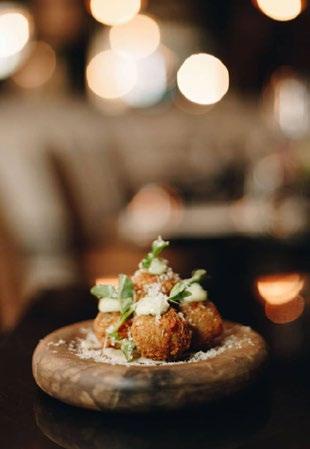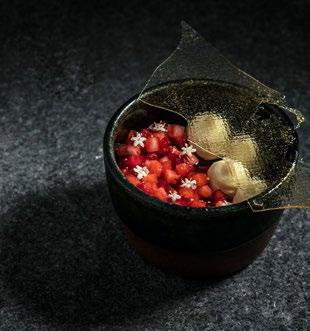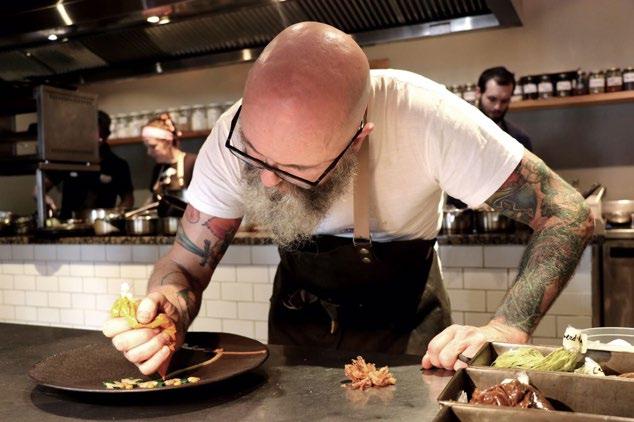
4 minute read
LIGHT AT THE END OF THE LOCKDOWN TUNNEL
MATT MANNING AND TEAM MATT MANNING’S LEGENDARY ARANCINI BALLS

Advertisement
LIGHT AT THE END OF THE TUNNEL
Ground-breaking initiatives such as the Restaurant Rescue Project, and Eat Out’s Restaurant Relief Fund, to which S.Pellegrino & Acqua Panna contributed substantially, are a lifeline for the survival and regeneration of the South African gastronomic landscape
The South African restaurant industry breathed a collective sigh of relief on 15th August when the lifting of the alcohol ban was announced. Restaurants world-wide have been struggling during the Covid-19 crisis but it has been particularly gruelling in South Africa.
Chefs Chris Erasmus of Foliage, Matt Manning of Grub & Vine and Peter Tempelhoff of Fyn share how they have survived lockdown and what is currently helping them move forward. THE RESTAURANT RESCUE PROJECT Saving the restaurant industry was on Alex Dale’s mind in late July. As the owner of Radford Dale Winery, he wanted to generate sufficient funds to really make an impact for each restaurant. Together with Matt Manning, Chef Patron of Grub & Vine, the Restaurant Rescue Project was born. Each restaurant is adopted by different wine estates. It’s a voucher system with a difference – purchase a voucher to dine at your chosen restaurant any time over the next 2 years, and you get a complimentary case of wine to the equivalent value (or more) from the partner wine estate/s. “Our 200 vouchers sold out in a matter of days generating a healthy cash injection for us,” says Matt. “From there it snowballed.” For the customer it’s a fabulous bargain – and the wineries, who also suffered during lockdown, are digging deep into their inventory and bringing out older fine wines to give away.
EAT OUT RESTAURANT RELIEF FUND Since it started in April, the Eat Out Restaurant Relief Fund has raised R1.67 m so far, distributing funds between 55 restaurants who are cooking for communities in need. This
GRUB - VINE

is not slowing down as restaurants start to re-open since the need is greater than ever.
“Our restaurant partners are still actively continuing with their feeding projects – although they have had to reduce their feeding days to allow for normal operations,” says Tarryn Corlett, Head of the fund. “Together, these restaurants have successfully managed to produce over 800 000 meals and this number continues to grow.”
ADAPTING, SURVIVING AND MOVING FORWARD Restaurants have come up with a diverse array of different offerings to survive through lockdown. Three chefs share what has worked for them so far: Grub & Vine has managed to keep all of its staff on payroll despite lockdown strains. Their survival through the worst months was helped by a new offering, says Matt. “Virtual dining, our interactive, athome fine dining experience, has been a success and a very positive thing to come out of lockdown - allowing us to create a new revenue stream.” They will be keeping this as part of their offering even when things return to normal.
Fyn has been evolving with their circumstances, adapting as they go along, and coming up with creative solutions says Chef Peter Tempelhoff. They started developing ideas for home deliveries early in lockdown. “We had photos of the dishes for Fyn from Home meals taken. After the shoot we packed up all the food to give away – we saw there was a huge need and started cooking for a local shelter. We’re still doing about 2000 meals a week through Ellerman House and Fyn. The need is still there, so we’ve put it into our roster to keep it going.”
Fyn is now open for sit-down lunches and dinners and have reimagined the restaurant interior with Japanese-inspired screens between tables and Perspex screens around the open kitchen. “We’ve adjusted our menus – you get a QR code for the menu with information on the dishes and ingredients, so you don’t have your waiter at the table explaining things,” he adds.
Foliage in Franschhoek kept its doors open in the first months of lockdown and spearheaded community food relief efforts in their area. Next, Chef Chris Erasmus focussed on Foliage’s survival. “We got permits to open as an essential business and turned the restaurant into a deli. Two Franschhoek chefs who’d
FYN

lost their restaurants are selling their products here,” he explains. When Foliage was finally able to open for sit down meals, Chris divided the space in two. The front section is the deli, the inner room the Foliage dining area serving lunch and dinner at weekends.
“We’ve been getting creative with things like non-alcoholic cocktails – keeping it fun!” says Chris. Foraged wild herbs and ingredients, always one of Foliage’s creative strengths, have an added benefit “We’re foraging a lot harder these days, so we buy less.” He adds that there is also no more saying no – they are extremely flexible these days and will cook anything a customer wants.
CHRIS ERASMUS - FOLIAGE











